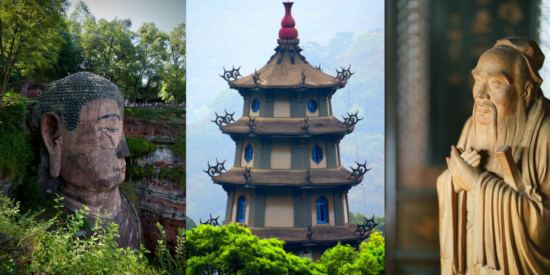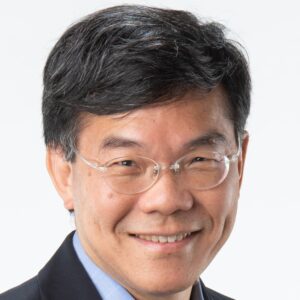In 2007, the New York Times, as well as many other Western media outlets, reported on the sudden surge of a national bestseller in mainland China, dubbed “the Confucian chicken soup for the modern Chinese soul.” The book is entitled Yu Dan’s Personal Takeaways from the Analects (《于丹〈论语〉心得》), authored by Yu Dan, professor of media studies at Beijing Normal University, published in 2006. More than four million copies were sold during the first year, and pirated copies would also be in the millions. (The English translation was published in 2009, entitled Confucius From the Heart: Ancient Wisdom for Today’s World.) Yu Dan admits that she is no expert in Confucian studies; she is only sharing with others how Confucius speaks to her heart and how the Analects can provide spiritual guidance for living in the ever-changing China at this time.
Indeed, this publishing sensation was not an isolated incident. This book was actually a follow-up of Yu Dan’s highly rated CCTV lectures in the “Hundred Schools Lecture Room” (百家講壇) lecture series in 2006. Among other things, this lecture series attempts to promote literacy of traditional Chinese culture and was instrumental in promoting a “Chinese classical learning fever” (國學熱) to every household in mainland China. This highly popular TV program is still going on daily on CCTV 10. Selling Chinese classical learning services became a very profitable business. A good example was when, in 2005, the Department of Philosophy at Peking University set up a business studio named Qian Yuan Chinese Classical Learning Studio (乾元國學教室), offering Chinese classical learning certificate intensive courses for business executives during weekends. This successful business is still continuing today; business executives find it cool to take Chinese classical learning classes from famous professors on the Peking University campus. This societal yearning for Chinese classical learning is, of course, a manifestation of the post-Cultural Revolution spiritual vacuum of the people in mainland China.
Christians need to acknowledge a fact. We might disagree on whether Confucianism is a religion or not. But Confucianism, together with Daoism and Buddhism, are spiritual traditions that have provided “chicken soup” for Chinese souls for more than two thousand years. Today, there is still a significant number of Chinese people who read Confucian, Daoist, and Buddhist classics for spiritual nourishment and consolation. Along with the slogan of “Cultural Confidence” (文化自信) promoted by the Chinese government in the last ten years, an increasing number of Chinese people are gaining literacy in these ancient classics.

When Protestant missionaries came to China in the 19th century, most of them held a dismissive attitude toward Confucianism, Daoism, and Buddhism. That might have worked when China was politically and militarily weak, and people blamed these Chinese schools of thought for the backwardness of China. But today’s China is very different. An increasing number of people in mainland China are fully convinced of the spiritual superiority of Chinese culture vis-à-vis Western culture.
Unlike Christianity, the doctrinal dimension of Confucianism, Daoism, and Buddhism is comparatively muted. Hence most Chinese who are under the influence of these traditional schools of thought are not interested in doctrinal discussions. They are not particularly interested in questions such as “Where does the universe come from?” or “Where are we going after death?” But all of them are interested in the issue of how to “settle down for spiritual pursuit” (安身立命). In philosophical idiom, the strength of traditional Chinese philosophy is neither in metaphysics nor in epistemology but in the philosophy of life. Western philosophies of life are no match to the Chinese counterparts in richness and profundity. (Trust me, I have a BA and PhD in philosophy.)
For the above reasons, I am offering an elective course entitled “Engaging with Confucian, Daoist, and Buddhist Spiritualities” at Fuller Theological Seminary in the winter quarter of 2024. This is probably the first time such a course is being offered at Fuller; it is offered for two reasons: missiological and theological. Missiologically, Islamic Studies is a recent addition to Fuller’s courses; the time is ripe to develop East Asian Studies as well. Theologically, one cannot do contextual theology for the Chinese people (and other East Asian peoples) without basic literacy in these schools of thought, traditionally known as “The Three Teachings” (三教).
English-language scholars are aware of the richness of Asian spiritualities to be explored. In the “World Spirituality: An Encyclopedic History of the Religious Quest” book series, two volumes each are devoted to Confucian Spirituality (2003, 2004) and Buddhist Spirituality (1993, 1999). The book series “Dimensions of Asian Spirituality” has published about ten titles so far. The scholarly consensus is that Confucianism, Daoism, and Buddhism are not just philosophies; they are spiritual traditions that many Chinese are still very proud of. Hence not a few Chinese people find themselves spiritually rich and so have no need of Christianity. If you go to mainland China and ask people why they study Chinese philosophy, most of them will tell you that studying Chinese philosophy can elevate one’s spiritual state of mind (提升人的精神境界). This positive and confident assessment is the legacy of the famous philosopher Feng Youlan. Hence though the English word “spirituality” does not have a good Chinese equivalence, the underlying idea has been there for a long time. Christians need to respect and engage with Chinese spiritualities in order to advance Christ’s kingdom in the Middle Kingdom. Only with such a cultural literacy will we then know how to have dialogue with these people and raise some smart questions on “settling down for spiritual pursuits” (安身立命).
Relevant Web Pages
“She Makes Confucius Cool Again” The Los Angeles Times May 7, 2007: https://www.latimes.com/archives/la-xpm-2007-may-07-fg-confucius7-story.html
百家講壇:https://tv.cctv.com/lm/bjjt/
乾元國學教室:http://www.qianyuangx.com/jpkc.aspx?one=3
文化自信:https://www.gov.cn/xinwen/2022-10/16/content_5718819.htm
Recommended Readings
Elshot, Gregg A. Ten. Confucius for Christians: What an Ancient Chinese Worldview Can Teach Us about Life in Christ. Grand Rapids: Eerdmans, 2015. (A BIOLA philosophy professor finds Confucianism helpful for Christian living in north America.)
Ching, Julia. “What is Confucian Spirituality?” In Confucianism: The Dynamics of Tradition, edited by Irene Eber, 63-80. New York: Macmillan, 1986. (This is the pioneering essay by a former nun who knows Catholic spirituality very well; reprinted in Tu and Tucker, ed., Confucian Spirituality)
Tu, Weiming and Mary Evelyn Tucker, editors of Confucian Spirituality. 2 volumes. Herder & Herder, 2003, 2004. (38 essays by different scholars touching many aspects of Confucian spirituality, including Confucianism in Japan, Korea, and Vietnam.)
Neville, Robert Cummings. Boston Confucianism: Portable Tradition in the Late-Modern World. State University of New York Press, 2000. (The author was a Boston University theologian; particularly relevant is chapter four, “Confucian Spirituality.”)
Yang, Fenggang and Joseph B. Tamney, editors. Confucianism and Spiritual Traditions in Modern China and Beyond. Brill, 2012. (Confucian and other Chinese spiritualities in the past, present, and future.)
Yoshinori, Takeuchi, editor. Buddhist Spirituality, two volumes. Herder & Herder, 1993, 1999. (33 essays by different scholars, covering also Buddhist spirituality in China.)
Keenan, Barry C. Neo-Confucian Self-Cultivation. University of Hawaii Press, 2011. (This is one title of the “Dimensions of Asian Spirituality Series”; about 10 titles have been published.)
Baker, Don. Korean Spirituality. University of Hawaii Press, 2008. (Another title of the “Dimensions of Asian Spirituality Series”; it also covers the influence of Confucian, Daoist, and Buddhist spiritualities in Korea.)
Image credit: Andawn F via UnSplash. In-text collage: Terry Zhong via UnSplash (Buddha); jsbaw7160 via Pixabay (Daoist temple); Yosuke Ota via UnSplash (Confucius).

Ping-cheung Lo
Dr. Ping-cheung “PC” Lo holds a PhD in Religious Ethics (Yale, 1990) and a PhD in Philosophy (SUNY at Buffalo, 1982). After completing a 31 year career of teaching and administration at Hong Kong Baptist University, he and his entire family relocated to Southern California in 2021. He taught for …View Full Bio
Are you enjoying a cup of good coffee or fragrant tea while reading the latest ChinaSource post? Consider donating the cost of that “cuppa” to support our content so we can continue to serve you with the latest on Christianity in China.